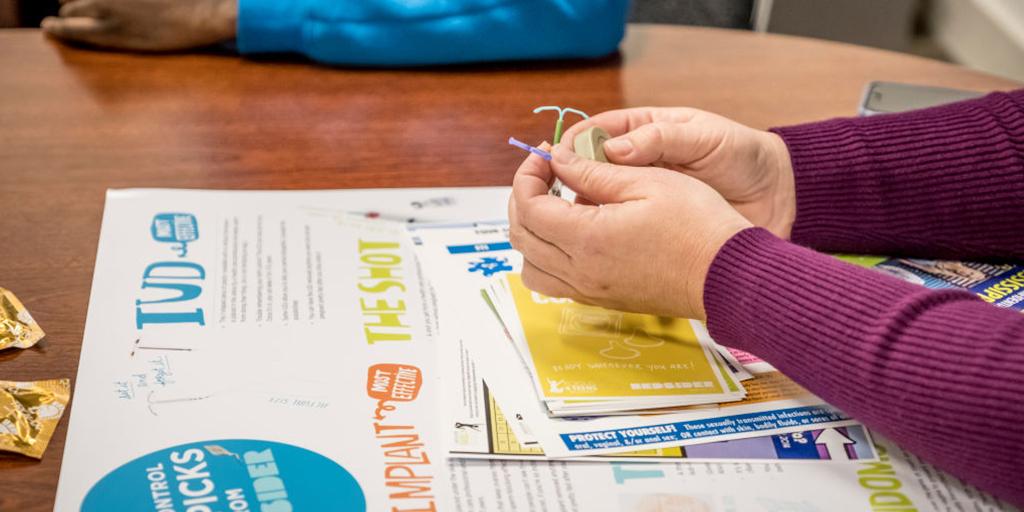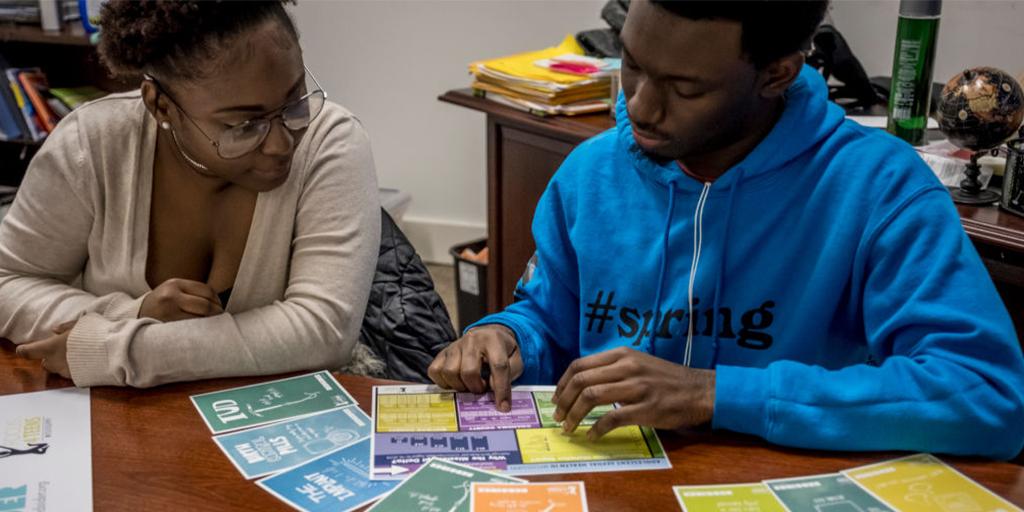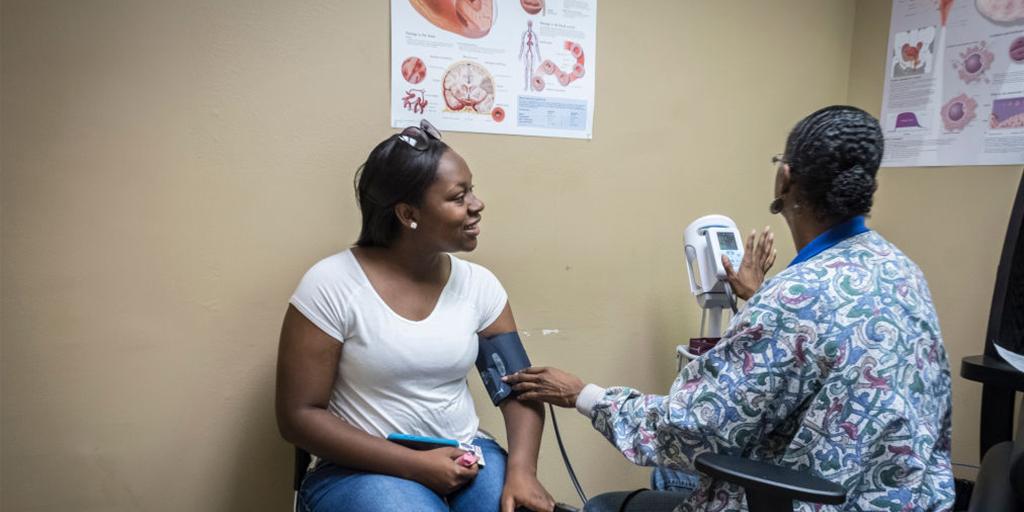Innovations in Family Planning Clinical Service Delivery for Underserved School-Based Populations
High-quality, comprehensive family planning services for adolescents are crucial to efforts to reduce the risk of unwanted pregnancy and sexually transmitted diseases. However, young adults often do not use family planning services due to their concerns about confidentiality and their lack of knowledge about how to access services, as well as clinics’ lack of youth-friendly or culturally sensitive practices. These barriers are particularly common among populations that are traditionally underserved or located in resource-limited areas and often experience poor reproductive health outcomes.
High schools and community colleges may offer ideal entry points for family planning providers to serve this population. Many school-based health centers (SBHCs) are strategically located in low-resource communities, and community colleges tend to serve students from lower socioeconomic brackets; these institutions are uniquely positioned to provide access to underserved young people. As family planning providers look for new ways to improve service delivery to youth, there is a need to document and disseminate successful strategies being implemented to serve youth in school-based settings.
With funding from the Office of Population Affairs and in partnership with the School-Based Health Alliance, Child Trends is conducting research to identify, evaluate, and disseminate successful strategies for providing family planning services to adolescents in school-based settings. A key goal of the study is to increase family planning providers’ knowledge of ways they can collaboratively work in and/or with schools and community colleges to better reach underserved adolescents and young adults.
Study Activities
To meet this goal, the study team will engage in the following stages of research from 2019 to 2022:
- Identify innovative strategies that programs or providers use to improve family planning service delivery to school-based populations. Child Trends and its partners will interview family planning providers across the United States to identify successful strategies for reaching, engaging, and serving adolescents and young adults. We are particularly interested in learning about innovative ways to provide better family planning services to populations that are typically underserved or located in areas with limited health care resources.
- Explore facilitators and barriers to developing and sustaining these innovative strategies. Child Trends will visit three clinics or programs to conduct in-depth evaluations of promising strategies and explore whether these practices could be adopted by other practitioners and programs.
- Develop and disseminate practical guidance on implementing innovative practices for family planning programs in the United States. Based on these interviews and evaluations, the team will create user-friendly toolkits. The toolkits will guide family planning programs in adopting innovative service delivery strategies to improve program reach among school-based populations.

Briefs
School-based Strategies to Support Adolescent Sexual and Reproductive Health
This interactive web brief compiles strategies that schools and school-based health service providers can use to better meet their students’ sexual and reproductive health care needs. The resource outlines strategies that improve both students’ access to services—such as providing contraception on-campus and establishing school-clinic partnerships—and the quality of the services themselves, such as integrating contraceptive counseling apps and developing peer education programs. Additionally, it provides real-world examples of where these strategies have been implemented. The information provided in this brief was drawn from a comprehensive literature review.
Learn more >>
Strategies for Providing School-based Family Planning during COVID-19
This brief summarizes innovative strategies that school-based health centers can use to reach students and remotely administer family planning services, given widespread school closures and safety concerns related to COVID-19. These strategies, based on interviews with providers and focused on early adaptations to the COVID-19 pandemic, are as follows: 1) using social media and phone calls to connect with students, 2) setting up a phone line for students to inquire about sexual and reproductive health services, 3) uploading videos to social media to educate students virtually, 4) using proxy servers and HIPAA-compliant videoconferencing platforms to ensure confidentiality in telehealth services, 5) using apps and patient tools to improve the contraceptive counseling experience, and 6) dispensing hormonal contraceptives in alternate locations or via pharmacy delivery.
Learn more >>
This brief highlights strategies that practitioners can use to raise awareness and increase use of family planning services offered by school-based health centers (SBHCs). Based on interviews with school-based health practitioners, we identified three approaches for practitioners to reach and engage with youth: (1) Connect with youth inside the classroom to present sexual health education and information about SBHC services; (2) create opportunities outside the classroom to provide information about family planning services; and (3) collaborate with youth to brainstorm and implement innovative outreach strategies.
Learn more >>
Family Planning Practitioner Perspectives on Developing Partnerships to Provide Services in Schools
This brief explores how schools and school-based health centers (SBHCS) can use community partnerships to increase teens’ access to reproductive health services. We highlight specific examples of partnerships that have benefitted practitioners in two school contexts: schools that currently have an SBHC and schools that do not. We also provide recommendations for schools and SBHCs interested in implementing similar partnership approaches. The partnership strategies shared in this brief were implemented successfully in schools with varying levels of local support and a range of available family planning resources.
Learn more >>

Presentations
Providing Adolescent-Friendly Family Planning Services in School Settings
This presentation highlights strategies for providing adolescent-friendly sexual health care in school settings, based on interviews with over 50 school-based providers and staff. The material comes from the project’s online Toolkit for Improving Family Planning Services in School Settings, which offers practical guidance for practitioners looking to improve family services for youth. The slides 1) summarize the six core strategies that school-based providers often use to ensure adolescent-friendly sexual health services and 2) explore two strategies in greater depth. These slides were presented on July 11, 2023 as part of a panel discussion on designing innovative family planning services for adolescents at the Title X Grantee Conference.
Learn more >>
Innovative Practices for Providing Sexual Health Education and Services in Schools
This webinar features presentations by four organizations that serve young people in school settings: Nationwide Children’s Hospital, the Minneapolis Health Department, La Clínica de la Raza, and AccessMatters. Representatives from each organization discuss a unique and innovative strategy they use to deliver sexual health education and family planning services in the school context. Presentations cover how the strategies work, why they were developed, challenges or barriers to their implementation, and tips for sustainability. This webinar was hosted by Child Trends on February 16, 2023.
Learn more >>
- Related presentation: Innovative Practices for Providing Sexual Health Education and Services in Schools, February 16, 2023
This presentation highlights motivators for providing family planning in school-based health centers, barriers and facilitators to incorporating such services, and key areas of innovation. The latter include partnerships, outreach, and adolescent-friendly practices. This presentation also includes practitioner recommendations for implementing practices within each key area of innovation. These slides were presented on July 16th, 2021 at the Title X Grantee Conference.
Learn more >>
This presentation describes how the project team’s definitions and interpretations of innovation have evolved throughout the research on innovations in school-based family planning service delivery, from the project proposal throughout the course of the project. The presentation concludes with lessons learned (e.g., innovation does not need to be fancy or expensive; innovation is often context- and site-dependent, etc.). These slides were originally presented at the APHA conference in October 2020 but were updated slightly based on additional findings for this presentation on July 16, 2021 at the Title X Grantee Conference.
Learn more >>
- Related presentation: APHA Conference, October 26, 2020
How SBHCs Can Support Student Sexual Wellness During COVID-19
This presentation summarizes challenges that school-based health centers have faced in providing sexual health services as a result of COVID-19, and shares strategies used to overcome these challenges. The presentation focuses on three aspects of school-based sexual health service provision that have required innovative strategies due to the pandemic: reaching students, maintaining confidentiality, and connecting students to care. These slides were presented on May 14, 2021 at the Adolescent Health Initiative Conference in collaboration with the School-Based Health Alliance and Northwell Health.
Learn more >>
This poster shares innovative practices in family planning and clinical service delivery for historically excluded youth in school settings, as determined by a literature scan and a series of interviews with providers. We identified four innovative practices that emerged from the literature scan and an additional five that emerged from the interviews. The poster also includes a summary of contraceptives dispensed in school-based health centers nationwide, drawn from the National School-Based Health Care Census. This poster was presented in September 2020 at the National Reproductive Health Conference.
Learn more >>
- Related presentation: APHA Conference, October 26, 2020

Project Contacts
Child Trends project directors
- Jennifer Manlove, PhD | 240-223-9262 | jmanlove@childtrends.org
- Jenita Parekh, PhD, MPH | 281-660-0471 | jparekh@childtrends.org
Federal program officer
- Callie Koesters, MPH, CHES | 240-453-8128 | callie.koesters@hhs.gov
© Copyright 2024 ChildTrendsPrivacy Statement
Newsletter SignupLinkedInThreadsYouTube